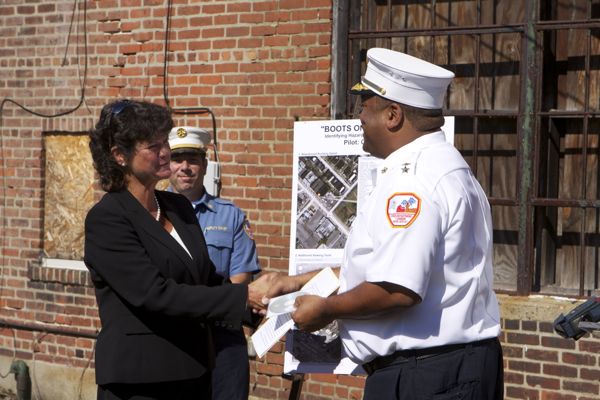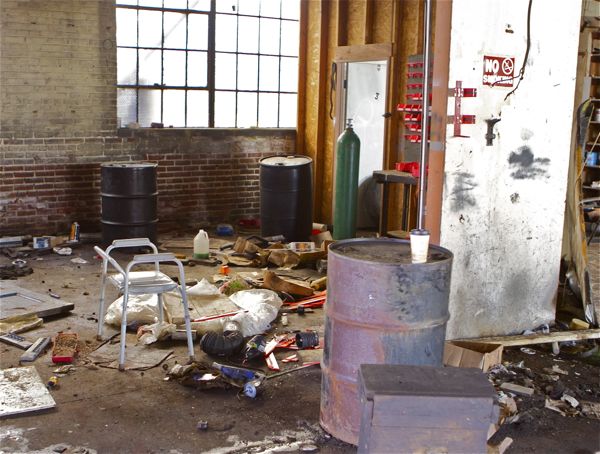DEP hands off a major statewide responsibility to local government
No State Resources or Regulations
Community & Worker Right-to-Know Contradicts Gov. Christie’s Agenda
Yesterday the DEP held a press event in an abandoned building in Camden to announce a Pilot Program regarding safety and health risks to firefighters and emergency responders caused by chemicals and other dangerous materials stored in those buildings.
Aside from the fact that DEP used deeply offensive military metaphors to describe the program (i.e. “Boots on the Ground“) and – by focusing exclusively on risks to firefighters and emergency responders – failed to even mention environmental justice and community concerns, the actual results from the Pilot Program revealed significant health and safety risks.
The DEP Pilot Program not only documented significant risks at 31 abandoned buildings.
It exposed gaping loopholes in the existing statewide protection program that NJ DEP implements under the 1983 “Worker and Community Right to Know Act” – here are the DEP regulations for that program.
The Camden Pilot found buildings and dangerous materials that are not regulated under the current RTK program. These same kind of abandoned buildings and risks to the community and emergency responders are found in hundreds of NJ’s older industrial towns and cities.
Those risk to the community and emergency responders have been managed for 30 years on a statewide basis under the current RTK program.
But, curiously, DEP made no mention of the longstanding statewide RTK program.
No press asked about the RTK program during the event either.
This was likely because DEP would not allow questions from press during the press event.
I attended the event and DEP managers saw me chomping at the bit, ready to ask detailed and informed critical questions that would shine light on these issues. So, to prevent that, they took the unusual step of simply shutting down the event to questions after they finished speaking. Instead, DEP allowed only 1 on 1 questions inside the building, which made it impossible for me to educate media by asking an informed tough question.
This 1 on 1 interview tactic enabled DEP to get exactly what they wanted: the typical stenography of the mainstream media: favorable and uncritical press coverage (see this and this ). I spoke to Taunya English, reporter for WHYY who was the only one to mention the RTK program, but she allowed DEP’s Deputy Commissioner Kropp to dismiss my concerns in a comment that actually proves my point: there are LOOPHOLES in the RTK program! It needs to be expanded to address the same risks posed by abandoned buildings!
But when I later questioned DEP about how the Camden Pilot related to the existing RTK program during the one on one interviews, DEP expressed no interest in modifying, funding, and expanding the current statewide RTK program to close the loopholes and reduce the risks documented by the Camden Pilot Project.
Nor would DEP identify any allocated funding or staff resources (i.e. actual “boots on the ground”) for funding a Camden program or a statewide program.
So, why is that?
Let me explain why this DEP event was more media stunt than an actual effort to develop a policy or program.
First of all, the primary goals of the RTK law are to protect “workers” and the “community” from risks from chemicals via a statewide regulatory program.
Here are the 1983 legislative findings – this is forbidden territory that the Christie DEP just doesn’t want to go there. They won’t even talk about any of the legislative objectives highlighted in boldface from the law itself:
34:5A-2. Legislative findings and declarations
The Legislature finds and declares that the proliferation of hazardous substances in the environment poses a growing threat to the public health, safety, and welfare; that the constantly increasing number and variety of hazardous substances, and the many routes of exposure to them make it difficult and expensive to adequately monitor and detect any adverse health effects attributable thereto; that individuals themselves are often able to detect and thus minimize effects of exposure to hazardous substances if they are aware of the identity of the substances and the early symptoms of unsafe exposure; and that individuals have an inherent right to know the full range of the risks they face so that they can make reasoned decisions and take informed action concerning their employment and their living conditions.
The Legislature further declares that local health, fire, police, safety and other government officials require detained information about the identity, characteristics, and quantities of hazardous substances used and stored in communities within their jurisdictions, in order to adequately plan for, and respond to, emergencies, and enforce compliance with applicable laws and regulations concerning these substances.
The Legislature further declares that the extent of the toxic contamination of the air, water, and land in this State has caused a high degree of concern among its residents; and that much of this concern is needlessly aggravated by the unfamiliarity of these substances to residents.
The Legislature therefore determines that it is in the public interest to establish a comprehensive program for the disclosure of information about hazardous substances in the workplace and the community, and to provide a procedure whereby residents of this State may gain access to this information.
And it’s not just DEP that doesn’t want to talk about any of these issues – the RTK program seems to have fallen off both the media and environmental community’s radar screen.
So, no wonder the depleted press corps gets spun by this kind of photo op stunt.
Second of all, as announced via a comprehensive set of Executive Orders that Governor Christie issued in his first hour in office, the Christie DEP policy agenda is:
- to promote economic development (Executive Order #3)
- to reduce “job killing red tape” (Executive Order #1)
- to provide “regulatory relief” (Executive Order #2),
- to reduce the size, scope, budget and burden of DEP, and
- to eliminate “unfunded state mandates” (Executiver Order #4).
An expansion of the RTK program would violate each one of these policies set by Governor Christie via Executive Order: a real statewide urban abandoned building program would require more DEP regulatory burden, more DEP staff, more DEP budget, and more DEP unfunded mandates.
That’s why DEP whitewashed the RTK program – and instead called it a Pilot Program. That enabled them to irresponsibly hand off a major statewide responsibility to local government.
If DEP were serious, they would propose regulations or go to the Legislature to seek an expansion of the current RTK program to abandoned buildings and the other dangerous materials found in those buildings that are not regulated under the current RTK program.

DEP hands off the program to Camden Fire Chief - no DEP "Boots on the Ground" (hand off or hand job?) * DEP press office is offended by the sexual connotation. I would have used the term "lip service" - which has similar sexual connotations - but, since DEP described the photo op depicted as a "hand off", I didn't want to mix my metaphors. Larry Rangonese is a real WANKER! More to follow on this.
End Note: – maybe I should offer an example to better illustrate my point.
Suppose DEP held a press conference announcing a pilot program where they found 32 pipes discharging pollution to a river in a specific city.
Supposed DEP then called that a pilot study, gave the city a GIS map of the pipes, and said “have at it”: clean them pipes up and protect the river from pollution.
And suppose, while doing all this, DEP didn’t mention a word about the Clean Water Act and their permitting and enforcement responsibilities under the Clean Water Act.
Now you see my point on what went on here?


There once was a DEP
A failure it’s plain to see
So cue up the Mop for the photo op
To spew forth their fantasy
Pingback: WolfeNotes.com » Camden NJ and the Democratic Convention
Pingback: WolfeNotes.com » Now Is the Time To Make Real Demands On Environmental Justice Legislation